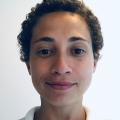
UK Black Pride welcomed thousands of lesbian, gay, bisexual, transgender and queer people of colour to its new home in Haggerston Park on Sunday.

The celebration is organised by and dedicated to LGBTQ+ people of African, Asian, Caribbean, Middle Eastern and Latin American descent.
They can face discrimination from both the communities they grew up in and the wider LGBTQ+ community itself.

Black Pride is an event that celebrates the diversity of LGBTQ+ people and recognises unique struggles that queer people of colour - QTIPOC, or queer, transgender and intersex people of colour - face.
British-Iraqi writer, drag performer and filmmaker Amrou Al-Khadi spoke of his first experience at Black Pride last year.

"It can be particularly tricky for queer people of colour or faith intersecting at the site of different opposing groups," he told the Gazette.
"Being queer and Muslim, you kind of exist on this tectonic faultline where a lot of Muslims hate you for being gay and a lot of gay people are quite Islamaphobic, and I [thought]: 'I'm not going to belong anywhere.'

"Then all of a sudden, I heard this song from my childhood a song by a Muslim singer called Umm Kulthum, and I was like: 'How am I hearing this at a queer space? I only [heard] this when my mum grounded me for wearing pink socks!'
"Then I looked to the left and it was almost like this apparition of people who had always been there. It was queer Arabs and Muslims in Pride. It was just in my periphery my whole life."

Birmingham has seen weeks of protests by some faith groups against the inclusion of LGBTQ+ people's stories and rights in teaching.
Ferhan Khan, a queer Muslim activist, spoke on a panel at Black Pride about what queer Muslims can do to educate those around them community and stand up to homophobia.

He told the Gazette how important it is to be "as visible as you can without putting your life in danger".
"Pride means a celebration of being who I am - uncompromising, unequivocally who I am, 100 per cent," said Ferhan.

There are 72 countries today that criminalise gay relationships. Some still have the death penalty.
It follows that people who come from or exist within communities not accepting of LGBTQ+ identites may hide who they are - Black Pride is an opportunity for them to express these identities and see others like themselves.

One member of Rainbow Sisters, a support group for lesbian and bisexual women asylum seekers, spoke about about struggling with her sexual identity after leaving Uganda 18 years ago.
She found a "family" in the LGBTQ+ community and was proud and happy to attend Black Pride.

"I'm telling you," she said, "it's really important you feel you are with your family.
"If I'm with my family I feel so happy - I feel so great. I feel I'm loved 'cause ever since I was born I've never been loved.

"Before, I didn't have a family, so now I feel I've got people who love me around - I'm really so grateful for all LGBTQ+ people in the world. They're the most beautiful people."
Rainbow Sisters were shocked to see Serco marching in Saturday's main Pride parade. The contractor runs the Yarl's Wood immigration detention centre, where some of the group's women were detained.

They opened the wellbeing and wellness stage. As well as discussions on issues and concerns important to queer people of colour, there was music by LGBTQ+ artists while many enjoyed the African and Caribbean food on offer.
Black Pride has been running for 13 years, having been founded by a group called Black Lesbians in the UK.

Last year it was held in Vauxhall Pleasure Gardens, but since the number of people attending has grown, the biggest Pride celebration of its kind in Europe has moved to Hackney.







































Comments: Our rules
We want our comments to be a lively and valuable part of our community - a place where readers can debate and engage with the most important local issues. The ability to comment on our stories is a privilege, not a right, however, and that privilege may be withdrawn if it is abused or misused.
Please report any comments that break our rules.
Read the rules here